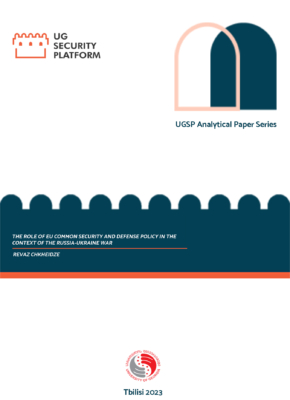
 The Role of EU Common Security and Defense ...
The Role of EU Common Security and Defense ...
Revaz Chkheidze
Executive Summary
Over the years, the EU's Common Security and Defense Policy (CSDP) has evolved with challenges. At the same time, the scope of CSDP was gradually expanding, which required closer work with partners. New challenges were reflected in the EU Global Security Strategy adopted in 2016, which further highlighted the issue of the EU's strategic autonomy in the international arena.
In the wake of other fundamental documents, in 2022 the European Union developed a "Strategic Compass", which was given additional burdens by the Russia-Ukraine war. In fact, for the first time, it clearly defines the measures of the future defense and security policy of the European Union. The European Peace Facility (EPF) was established as another important, but this time, financial mechanism for the implementation of the security and defense policy, which is actively used in the context of the aid allocated to Ukraine by the European Union.
The involvement of third countries in the common foreign and security policy of the European Union is supported by the relevant mechanisms, which also underwent a considerable evolution, which was accelerated by the process of adequately re-evaluating the international relations situation on the part of the European Union.
As a result of Russia's full-scale military intervention in Ukraine in February 2022, the EU completely changed its approaches and cautious attitude in terms of assistance to the military component of Ukraine, which was caused by Russia's rude and brazen crossing of red lines in international relations that existed even before the war.
Since the beginning of the Russia-Ukraine war, the financial aid allocated by the European Union to Ukraine for military purposes amounted to 3.1 billion euros, in addition to bilateral aid. Along with this, the Military Assistance Mission for Ukraine (EUMAM) was launched, within the framework of which up to 15,000 soldiers of the Armed Forces of Ukraine will be trained mainly in Poland, as well as in Germany. Overall, it is the first time, the EU directly provides military aid to a third country.